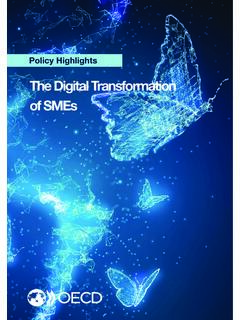Transcription of Analysis of Factors Affecting Inflation and its Impact on ...
1 European Research Studies Journal Volume XX, Issue 4B, 2017. pp. 38 - 56. Analysis of Factors Affecting Inflation and its Impact on Human Development Index and Poverty in Indonesia Y. Yolanda1. Abstract: This study has the objective to analyze the effect that occurs between Indonesian Bank (BI)- rate, Foreign Exchange Rates, Money Supply, oil price and gold prices on Inflation , its Impact on human development Index (HDI) and poverty in Indonesia for the period 1997 up to 2016. This study used secondary data with purposive sampling method. Methods of data Analysis using multiple regression Analysis , Model 1: Results of this study indicate that there are significant variables simultaneously at BI Rate, Foreign Exchange Rates, Money Supply, oil price and gold prices to the level of Inflation in Indonesia. The results also showed variable BI rate, money supply, oil price and gold prices partial effect on the level of Inflation positively and significantly, while the exchange rate variable does not affect the rate of Inflation .
2 The results determinant coefficient of the ability of independent variables to explain the dependent variable of % , while the remaining 5,03 % is influenced by other variables and are not included in this study. Model 2: Inflation on HDI is significant and positif and model 3: Inflation on poverty is significant and positive. Keywords : Exchange rate , JUB , BI rate, oil price, gold price, Inflation , HDI and Poverty. 1. Lecturer of Faculty of Economnic, Borobudur University Jakarta, Indonesia Email : Y. Yolanda 39. 1. Introduction Inflation is one of the most important macroeconomic variables and the most feared by the economic actors, including the Government, because it can bring bad influence on the structure of production costs and the level of welfare. And the wider effects such as instability, economic growth, the declining of competitiveness, the interest rate, uneven income distribution and unemployment is increasing.
3 Some of the countries that have experienced hyperinflation showed that poor Inflation would lead to social and political instability, and did not create the economic growth (Sukirno, 2004). The year 1998 was the toughest year for the economy of Indonesia, where the rate of Inflation was per cent, the falling value of the rupiah against foreign currencies and socio-political Factors that are not safe, resulting in the prices of goods and services continue to rise sharply until the end of 1998. Entering the year 1999. Inflation rate can be on tap to percent, this is the lowest Inflation rate over a span of 20 years (1987-2006). The decline in Inflation was caused by the strengthening of the rupiah in the foreign exchange market and also the prices of goods and services on the market which can be controlled by the government. Ahead of the annual session of People's Consultative Assembly (August 2000), the Inflation rate has risen to percent with CPI of percent, the increase in Inflation is related to a series of government policies such as the reduction of fuel subsidies, excise tax and an increase in request of goods and services by the community to celebrate the same religious day.
4 In late 2002 there was a bomb blasting in Bali (Bali tragedy). This condition does not improve the rate of Inflation , but only affects the Inflation rate quarterly or monthly. In 2003, Inflation declined from the previous year of per cent that are affected by the improvement in the real sector and the confidence of investors to Indonesia. At the end of 2004 (December 26, 2004), there were an earthquake and tsunami that hit Aceh and parts of Sumatra, so that the rate of Inflation in 2005. became per cent, then in 2006 the rate of Inflation achieved percent. Inflation can be caused by excess/pull request (liquidity/money/currency) occurs due to excessive total demand which is usually triggered by a flood of liquidity in the market resulting in a high demand and trigger changes in the price level. Increasing the volume of the medium of exchange or liquidity associated with the demand for goods and services resulting in increased demand for Factors of production.
5 The increasing demand for production Factors causing prices to rise. While Inflation insistence costs (cost push Inflation ) occurs due to the scarcity of production and/or also include the scarcity of distribution. The lack of launch of distribution flow or the reductionof production provided from the average normal demand could trigger a price increase in accordance with the legal validity of the demand-supply. Analysis of Factors Affecting Inflation and its Impact on Human Development Index and Poverty in Indonesia 40. The phenomenon of Inflation in Indonesia is not a short term phenomenon and occurs situationally, but as was common in other developing countries, Inflation problem in Indonesia is more on the issue of long-term Inflation due to it still has a structural barriers in the country's economy, Besides, Inflation is more influenced by the surge in oil prices in the international market and the scarcity of raw materials as coal and gas, all of which will cause rise in energy costs.
6 This may encourage further energy source procurement costs of electricity and fuel for most mills. Likewise, the same thing can happen on the distribution, which in this case the infrastructure factor plays a very important role. According to some research about the Factors that affect Inflation : (1) Asghapur, Kohnehshahri and Karami (2014), the interest rate has a negative correlation to Inflation . This is also supported by Kandel, Ofer, and Sarig (1996) which states that interest rates are negatively correlated with Inflation . (2) Ghazali (2003) found no significant relationship between interest rates and Inflation . (3) Heni Noviarita (2003) in the study Analysis of Inflation in Indonesia (Dynamic Model Approach). 1980: 03-2002: 04 period shows that for the long term, a variable amount of money supply, exchange rates, gross domestic product, Inflation expectations have a significant effect on Inflation .
7 (4) Bjornland (1997) asserts that the rise in oil prices has a long-term effect on core Inflation and output. (5) Saleem, S. and Ahmad, K. (2015) explain that for long and short term, the Money, Crude Oil Prices, Exchange Rate, Interest rates and taxes do not have a positive relationship while real GDP had a negative correlation to Inflation during the study period in Pakistan 1979 to 2012. (6) Zarshad Ahmed and Yasir Rahim stated that dollar, gold and Petrol Prices significantly took effect on Inflation in Pakistan (June 2008 to June 2013). (7). Pourroy (2012) investigated the role of exchange rate in Inflation targeting in developing countries and find strong evidence that exchange rate strategy plays a major role during Inflation shock in 2007-2008. Management of nominal exchange rate gives stronger anchor (better resistance to Inflation shock in 2007-2008).
8 (8). Chhibber et al. (1998), found that monetary growth, foreign prices, exchange and interest rates, unit labour cost, and real output are the key determinants of Inflation in that country. Inflation as an economic phenomenon will certainly have an Impact on economic activities, which often have a negative Impact on public finances, the purchasing power of money will be lower, and to get something, more money is needed and can ultimately affect builders of quality of life (community/population). Indicators used to measure the quality of human life is a human development index (HDI) was introduced by the United Nations Development Program (UNDP) in 1990 and published periodically in the annual report of the Human Development Report (HDR). According to the UNDP; HDI is a composite index that includes three areas of human development which is considered to be very basic, which is used as an indicator of (i) the areas of health: age life (longetivity); (ii) education: knowledge.
9 And (iii) the economic field: decent living standards (decent living). Y. Yolanda 41. Human development in Indonesia during the period 1996-2007 has increased, except for the period 1996-1999. It is not apart with the deteriorating situation of the Indonesian economy as a result of the economic crisis. Since the economic crisis in mid 1997, Indonesia's HDI has moved down to (1999) and led to Indonesia's position slipped to 110 th out of 177 countries, where before Indonesia was ranked 99 of 177 countries (UNDP, 2004). In 2004, up to the order of 108 (out of 177. countries), this sequence is better than other ASEAN countries such as Vietnam (109), Myanmar (130), Laos (133) and East Timor (142), and under the Singapore (25), Brunei Darussalam (34), Malaysia (61), Thailand (74) and the Philippines (84). Inflation influence on the HDI is based on the results of research from several reseachers; (1) Rita Otopea Osiakwan, Stephen E.
10 Armah (2013), Inflation has the negative and significant effects on the standard of living (meansure of HDI) in Ghana, Standard of living is only partially sensitive to Inflation however the adverse Impact of Inflation on standard of living Increasingly worsens as Inflation increases. Therefore in Ghana, people are Increasingly worse off as Inflation increases. (2). Zezza et al. in the Arab Naz et al. (2011) Inflation can disrupt business planning, nutrition, health and children's education. (3) Zeman et al. (2011) uses poverty growth model for countries of SAARC (Bangladesh, Nepal, Pakistan, India and Sri Lanka) in 1988-1909. Results showed that 1 percent increase in inequality income reduced poverty by percent and 1 percent increase in economic growth to reduce poverty by percent while trade openness and significant poverty reduction of health expenditures in SAARC countries.









